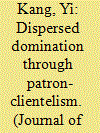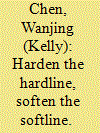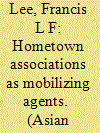| Srl | Item |
| 1 |
ID:
172252


|
|
|
|
|
| Summary/Abstract |
This study is based on 10 years of ethnography research in six cities in Sichuan after the Wenchuan earthquake. The author delineates local officials’ dispersed clientelist endeavours seeking stable collaboration with NGOs. In contrast to the corporatism model, in which government control of NGOs is formal and from the top down, the patron–client relationship entails considerably more subjectivity, flexibility and dispersion in the exercise of state power, which may or may not result in effective implementation of the state’s policy objectives. As local government officials increasingly deploy their informal authority in addition to their extensive institutional power, and as informal networks lubricate the policy process, state dominance over society becomes more pervasive, entrenched and fragmented.
|
|
|
|
|
|
|
|
|
|
|
|
|
|
|
|
| 2 |
ID:
185617


|
|
|
|
|
| Summary/Abstract |
Since the 1990s, the Chinese government has intensified efforts to control the political life of the diaspora by recruiting proxies, or qiaoling 侨领, from the extraterritorial population for community-based governance. This paper examines the efficacy of this co-optive strategy by investigating its ramifications in Lao Chinese business communities. Following a group of qiaoling in Vientiane through qualitative fieldwork, I reveal how these individuals are self-motivated to perform patriotism by the desire to earn symbolic recognition. Their fame and prestige as qiaoling are critical for their material accumulation in the often-fraudulent business of intermediation for Chinese bureaucrats and investors. As such, while contributing to realigning the political allegiance of the diaspora, qiaoling simultaneously reshape the ongoing expansion of Chinese capitalism in ways that diverge from Beijing's developmental agenda. This finding complicates the long-held imaginary of an autonomous state–diaspora synergy in post-socialist China.
|
|
|
|
|
|
|
|
|
|
|
|
|
|
|
|
| 3 |
ID:
192842


|
|
|
|
|
| Summary/Abstract |
Scholars have noted that the Chinese government has been grooming a range of grass-roots social organizations in Hong Kong since the handover. Hometown associations (HTAs), in particular, are seen as an important cultural nexus capable of integrating patron–client relationships based on material benefits with social relationships rooted in common culture and identity. Few studies, however, have documented the mobilizing power of HTAs quantitatively. This article examines the mobilizing power of HTAs in the 2021 Legislative Council elections, where the state attempted to promote voter participation to protect the legitimacy of the “reformed” electoral system. Analysis at the level of District Council constituencies shows that the presence of HTAs was indeed related to higher voter turnout. I also test whether the impact of HTAs was conditioned by population characteristics. General implications of the findings are discussed.
|
|
|
|
|
|
|
|
|
|
|
|
|
|
|
|